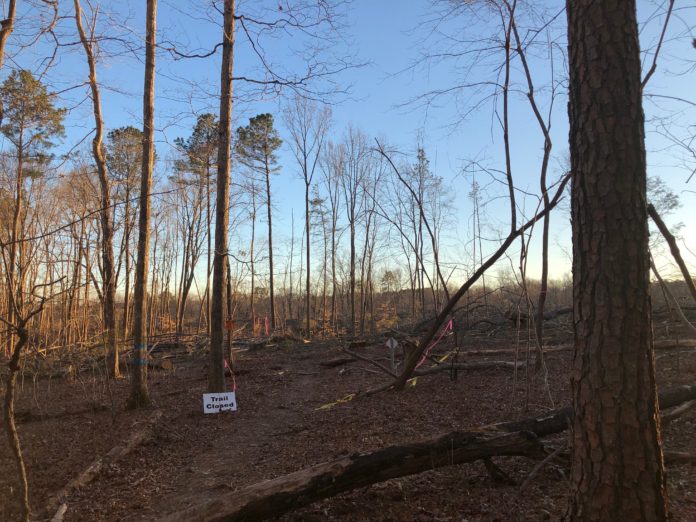
The clearcutting of 36 acres of forest off Seawell School Road recently concluded, removing trails the landowner had for decades made available to the public, including some Chapel Hill High School students who said the logging was unneeded.
But owner P. H. Craig thinks the public has not properly heard his case.
Craig has owned the full tract of 77 acres for over 50 years and thinks the logging is actually overdue. A tax break he received for designating the property as an “in use” tree farm let the land be left alone this long, he said, so he did not have to turn it into commercial real estate.
Instead, he let the public make use of its hiking or biking trails. Benjamin Reed, Chapel Hill High School’s mountain-biking advisor, said the club often cut through the Craig tract. Roughly 15 percent of the cross country and track teams’ routes ran through part of Craig’s woods, assistant cross country coach Dave Mabe estimated.
“Although our cross-country and track teams run through the affected area of woods routinely, thankfully, a lot of forest and trails on adjacent property will remain,” he said.
Craig said no other private forest in the state allowed trees to grow for so long. Duke Forest, for instance, keeps most of its trees under 20 years, he said.
“Now, if I had select cut every 20 years or so, that would have made sense,” he said, adding that he could have harvested three times during his years of ownership. “But you do not leave 90-year-old pines and expect the forest to regenerate or expect seedlings to grow amongst those old trees. If you think about it, it’s simply common sense.”
Fearing a pine-beetle infestation due to the age of the trees and receiving warnings from a forester over the potential hazards of dense, fire-prone thickets, Craig said he began planning in 2017 to thin the forest. He decided to have all the trees in 36 acres clearcut instead of having them removed selectively, a process he said would practically be too difficult.
Alarmed by the prospect of having the land cleared, some in Chapel Hill and Carrboro rallied to stop the logging. At a community meeting about the proposal in June, North Carolina State University forestry professor Doug Frederick said that Craig’s forest was worthy of protection.
“When I visited the tract last year, I did not see much risk for a southern pine beetle infestation in the older pines on the Craig tract. Nor did I see much risk of fire spreading to adjacent landowners,” Frederick said, adding that the forest, located between two protected properties, had high “ecological, teaching and research value.”
Some members of the cross country team supported the preservation effort. Senior Lilly Crook, who is also co-president of the Green Tigers club, dismissed Craig’s reasons for logging. “Forestry professionals have gone through the forest and said this forest is able to grow for 80 [more] years,” Crook said. “It is a point where migratory birds stop in their migration path.”
In years past, Craig said, he had offered to sell parts of his land—to the Triangle Land Conservancy (TLC), the town of Carrboro and the Nature Conservancy charity. But, he said, he received no offers. Once he submitted the plans for clearcutting last year, he negotiated with the town of Carrboro to sell his land; Craig said he found Carrboro’s offer to be “unacceptable.” (Town officials said the discussions remain private because no agreement was reached.)
Frederick, estimating that Craig could earn $100,000 to $200,000 from the timber before expenses, said he hoped Craig would have sold his land to the town and been compensated. Some environmental protection groups, such as TLC and Friends of Bolin Creek, tried separately to reach an alternative to clearcutting. One online petition by Friends of Bolin Creek, for instance, received almost 1,000 signatures.
Craig maintains that TLC and other groups “never made an offer.”
“Well, I am a businessman, in the real-estate business, and you either make an offer or not,” Craig said. “Talking about it is not an offer.”
At a public vigil held before the clearcutting, Craig took issue with some of the criticism, handing out flyers presenting his case for deforestation. He said that some of the efforts—particularly those claiming he, motivated by greed, rejected offers from parties other than the town—were “character assassination and personal attacks on me.”
Craig said he found some requests to protect his land “bizarre,” seeing the campaign as a group of people who “convened to decide what to do with my private property without my input” after he had provided “the most beautiful corridor in Orange County for 50 years.”
“I really don’t think I deserve that,” he said.
The clearcutting began October 31, after which time people were asked not to trespass on the property. As the tract stretches from Carrboro into Chapel Hill, both towns this summer approved plans requiring that a buffer of trees remain along a creek running through the property.
The clearing has had “a huge visual impact,” Reed said. “It’s not aesthetically pleasing to see the area cleared.”
Senior Olivia Vrba, a cross country runner and co-president of Green Tigers, said the effects of the logging were “sheer habitat loss.”
“It takes years and years for it to grow back to as dense of a forest as it was,” she said.
After time passes for natural regeneration, Craig must start to reforest by March 2020 by planting fast-growing loblolly pines. Craig worries, however, that loblolly pines could “fight” natural regrowth; Frederick said he wants the town to acquire the land and to let natural regrowth occur.
“Of course, we’re thankful for P. H. Craig allowing the community to use his property over the years,” Mabe said, “but are deeply saddened that an agreement that was positive for the entire community could not be reached.”











